- Home
- Mike Lupica
Travel Team Page 2
Travel Team Read online
Page 2
Watching this kid play ball.
Mesmerized, watching the way this kid, about as tall as his bad hip, could handle a basketball.
Watching him shoot his funny shot, pushing the ball off his shoulder like he was pushing a buddy over a fence. He seemed to miss as many shots as he made. But he never missed the folding chairs he was obviously using as imaginary teammates, whether he was looking at them when he fired one of his passes. Or not.
Watching the kid stop after a while, rearrange the chairs now, turning them into defenders, dribbling through them, controlling the ball better with his right hand than his left, keeping the ball low, only struggling when he tried to get tricky and double up on a crossover move.
The kid stopping sometimes, breathing hard, going through his little routine before making a couple of free throws. Like it was all some complicated game being played inside the kid’s head.
He hadn’t heard anybody coming, so he nearly jumped out of his skin when she tapped him on the shoulder, jumping back a little until he saw who it was.
“Why don’t you go over?” Ali said.
“You shouldn’t sneak up on people that way.”
“No,” she said, “you shouldn’t sneak up on people that way.”
“I was going to call tomorrow,” he said.
“Boy,” she said, “I don’t think I’ve ever heard that one before.”
Ali said, “You can catch me up later on the fascinating comings and goings of your life. Right now, this is one of those nights in his life when he needs his father, Rich. To go with about a thousand others.”
Richie Walker noticed she wasn’t looking at him, she was facing across the street the way he was, watching Danny.
“Why tonight in particular?”
“He didn’t make travel team,” she said now on the quiet, dark street. “Your travel team.”
“Look at him play. How could he not make travel?”
“They told him he was too small.”
2
JUST LIKE THAT—LIKE ALWAYS, REALLY—IT WAS AS IF HIS DAD HAD APPEARED out of nowhere.
Danny sometimes thought he should come with one of those popping noises that came with the pop-ups on the videos.
Pop-Up Richie Walker.
“Hey,” his dad said.
“Hey.”
This was one of those times Danny always carried around inside his head, where his dad would get down into a crouch, like one of those TV dads coming home from work, and put his arms out, and Danny would run into them.
Only it never seemed to happen that way. It happened like this: Both of them keeping their distance and neither one of them knowing exactly what to say.
Or how to act.
Richie Walker had never been a hugger. It was actually a joke with them, Richie having taught Danny when he was five or six what he called the “guy hug” from sports, one without any actual physical contact, one where you leaned in one way and the other guy leaned in the other way and then you both backed off almost immediately and did a lot of head nodding.
“In the perfect guy hug,” his dad had said, “you sort of look like you’re trying to guard somebody, just not too close.”
Like them: Close, but not too close.
Neither one of them said anything now. At least that way, Danny thought, they were picking right up where they left off.
His dad said, “How you doing?”
“I’m okay.” Danny put the ball on his hip. “What’re you doing here?”
All his dad could do with that one was to give a little shrug.
“You see Mom?”
“Just now.”
“You want to go inside?”
“I always liked it out here better.”
Danny thought about passing him the ball, knowing they’d always been able to at least talk basketball with each other. Instead, he turned and shot it.
Missed.
“You call that a jump shot?” his dad said. “Looks more like a sling shot to me.”
His dad, Danny knew, had always been more comfortable giving him a little dig than having a real conversation with him. His mom once said that the only time Richie Walker had ever been happy was when he was one of the boys. So all he knew how to do was treat Danny like one of the boys.
Except sometimes Danny didn’t know whether he was being sarcastic when he picked at him. Or just mean.
“No,” Danny said, retrieving the ball. “On account of, I can’t jump.”
Richie Walker said, “You need to work on your release. Or you’re gonna get stuffed every time.”
Danny thinking: Tell me about getting stuffed.
Danny dribbled back to the outside now, desperate to make one in front of him, like this was some test he needed to pass right away, barely looked at the basket before he turned and swished one.
“That better?”
“Not better form,” Richie said. “Better on account of, it went in.”
His dad moved out of the shadows from the back door then. Danny thought his dad could still pass for an older kid himself, with his white T-shirt hanging out of his jeans, low-cut white Iverson sneakers, untied. And, Danny could see he still had those sad, sad eyes going for him, as if he weren’t watching the world with them, just some sad old movie.
Same old, same old, Danny thought.
Richie was limping slightly, just because he’d limped slightly for Danny’s whole life. Moving like an old man, not just because of his knees, but because of the plate in his shoulder, and his rebuilt hip, the one he used to tell Danny the doctors made for him out of Legos, and all the rest of it.
“Anything new with you?” his dad said.
And just by the way he said it, trying to make it sound casual, like he was making an effort to start a conversation, Danny knew his mom must have told him about travel.
Danny stood there, twirling the ball, wanting to hug the non-hugger, and then he couldn’t help himself.
He started crying all over again.
The tears seemed to throw his dad off, like Danny had thrown a pass he wasn’t expecting.
Even then, Richie Walker wanted to talk about basketball.
They sat in two of the folding chairs.
His dad said, “You still do the one I showed you?”
“The one where I tape the bottom of my sunglasses and try to dribble through everything without looking down?”
“Yeah.”
“I raised the bar a little,” Danny said. “Sometimes I put a do-rag over my eyes and try to do it completely blindfolded.”
He actually saw his dad smiling then. Though Richie Walker could manage to do that without anything different happening with his eyes.
“So did I,” Richie said. “Except we didn’t call them do-rags, we called them bandanas.”
He picked up the ball in his big hands. Danny was always fascinated by his father’s hands, just because they didn’t seem to go with the rest of him. Like somebody with a tiny head and Dumbo’s ears.
Big hands. Huge hands. And those long arms that the writers used to say Richie Walker had borrowed from somebody 6-6 or 6-7; in one of the old stories he’d read, Danny couldn’t remember where, one of his dad’s old teammates with the Warriors had said, “Richie Walker is the only little 5-10 white man had to reach up to zipper his pants.”
He had been listed at 5-10 in his playing days, anyway.
But his dad had said that was only if you counted the lifts in his sneakers.
Danny watched as his dad—without even trying, almost not aware he was doing it, like somebody not knowing they were cracking their knuckles—dribbled the ball on the right side of his chair, took the ball behind him, keeping the low dribble, picking it up with his left hand on the other side, finishing the routine by spinning the ball on his left index finger before putting it back in his lap.
“Your mom already told me what happened,” he said.
Danny said, “I figured.”
“They still do the tryouts th
e way they did in the old days—two nights?”
Danny nodded. “The dads running the twelves can’t have one of their own sons trying out. There were, like, six of them doing the evaluation. Mr. Ross didn’t get to do any evaluating because of Ty, but he was in the gym the whole time.”
“Just in case they needed somebody to explain basketball,” Richie said.
Jeffrey Ross was the president of the Middletown Savings Bank. President of the Middletown Chamber of Commerce. President of Middletown Basketball. Danny had always wondered if his son, Ty—the best twelve-year-old basketball player in their town, or any town nearby—was required to call his father Mr. President, or if he could get by with Dad.
“He still act as if somebody should stop and give him the game ball if he actually remembers your first name?” Richie said.
“Some of the other kids were saying that you don’t have to worry about him blowing his whistle, because somebody already stuck it up his you-know-what.”
Richie Walker said, “It was the same way when he was your age.” He gave Danny a long look now and said, “He say anything to you?”
“Not until tonight, really, when he called to tell me how sorry he was that I didn’t make it. He said he didn’t want me to find out in a letter.”
“Right,” Richie said.
“The only other time I actually heard him say anything was when he welcomed us all the first night.”
“He thinks he’s the mayor.”
“Mom says that in his mind, it would be a step down, from his current position as king.”
“That’s all you ever got out of him? That he was sorry?”
Danny said, “There was the one other thing, as we were breaking up into groups the first night. He was talking to a couple of the evaluators—you know, the clipboard guys?—and he told them, ‘Remember, I want us to get bigger this year, last year we were too small and we couldn’t even get out of the sectionals.’”
“He said that he wanted the twelve-year-old travel team from Middletown to get bigger?”
Danny nodded.
“What,” Richie said, “so we can match up better with the Lakers?”
Danny told him the rest of it.
How the travel teams in town still went from fifth grade through eighth, but that seventh grade was still the glamour team in Middletown, in any sport.
Richie: “So that hasn’t changed.”
Danny: “You guys were the ones who changed it, remember?”
Richie: “Nobody ever lets me forget.”
This year there were thirty kids trying out for twelve spots. The first night, Danny heard one of the moms in the parking lot saying that none of the other age groups had even close to that many boys trying out. Last year, Danny told his dad, they’d only had to cut seven kids when he’d made the sixth-grade team.
“This is all about the chance to get to the nationals,” Richie said, “and be on television. Parents probably think it’s the peewee basketball version of one of those Idol shows. Or one of those talented-kid deals. Think Dick Vitale or somebody is going to discover their little Bobby as a future all-America.”
“That’s what happened with you guys,” Danny said.
“Yeah, and the town never got over it.”
His dad didn’t usually like to talk about what he called back-in-the-day things. Or talk about anything else, really. Tonight was different, and Danny didn’t know why. He just knew it was the two of them, sitting here.
The way Danny had always thought things were supposed to be.
“Back to you,” Richie Walker said.
Like passing him the ball.
Okay, Danny said, first night they all did some basic drills, shooting and dribbling and fast breaks and passing and one-on-one defending; they broke up the big guys and little guys as evenly as they could and scrimmaged for the second hour, while the evaluators sat in the gym at Middletown High School, carrying those clipboards.
Evaluating their butts off.
Richie said, “How’d you do?”
“I thought I was flying,” Danny said. “I mean, I knew I was going to look better because I had Ty Ross on my team. But when I got home, I told Mom that I didn’t want to get ahead of myself or anything, but I thought I’d made the team.”
“He’s that good? The Ross boy?”
“Better than good. He’s someone for me to pass the ball to.”
The second night, the one that killed him, they scrimmaged the whole night. When Mr. Ross called to give him the bad news, he said that what they’d tried to do, in the interest of fairness, was have the kids on the bubble spend the most time on the court.
Richie said, “He actually used those words? On the bubble?”
“His exact words.”
“The whole goddamn world is watching too much sports on television, and don’t rat me out to your mother for swearing.”
“The second night,” Danny said, “I didn’t have anybody big who could catch, or shoot.”
“Out of all those bubble boys.”
Danny said, “They had this new kid from Colorado guarding me.”
“How big?”
Danny looked down at his old white Air Force Ones, high-tops, noticed a new hole near his right toe. “Big enough.”
He didn’t know anything that night about being on some stupid bubble, he told Richie Walker now. He could just tell that everything got real serious toward the end; that he would look up sometimes when he made a good play, when he made a good pass or got past the Colorado kid—Andy Mayne—and got to the basket, hoping to see some reaction from the clipboard dads.
“Guys like that,” Richie said, “they’re too busy getting ready to agree with each other.”
“Anyway,” Danny said, “the last fifteen minutes or so I played like crap, I didn’t need anybody to tell me that afterward. I was just hoping then that they hadn’t forgotten how good I thought I looked the night before.”
“They tell you they’d send out letters telling you whether you’d made it or not?”
Danny nodded. “We’d all filled out the envelopes with our addresses on them when we checked in.”
“But Jeff Ross called you personally.”
“Because you and Mom and him are old friends.”
“What a guy.”
They sat there in the cool night, listening to the sounds of Earl Avenue, up and down the block, an occasional car passing, the Malones’ cocker spaniel yapping away, rap music coming from somebody’s bedroom window, Danny content to sit here like this until morning.
Danny finally said, “You haven’t told me yet what you’re doing here.”
Richie Walker grinned at his son, and did what he’d do sometimes, put a little street in his voice.
“Doing the same thing I have my whole life, dog,” he said. “You know, chillin’ and lookin’ for a game.”
He took the ball out of his lap and handed it to Danny. “Shoot for it.”
“Winners out.”
“You feeling any better?”
Danny had already decided something: He wasn’t going to cry about this ever again. Not in front of his parents, not in front of himself.
No more crying in basketball.
“I’ll feel better when I beat the great Richie Walker in a game of one-on-one.”
He dribbled to the foul line, getting fancy, crossing over with his right hand to his left, wanting to come right back with the ball and go straight into his shot.
“Don’t take this the wrong way, junior,” his dad said. “But that move needs work.”
Danny said to his dad, “Yeah, yeah, yeah, you want to talk or you want to play?”
3
SOMETIMES DANNY WOULD GOOGLE UP HIS DAD’S NAME WHEN HE WAS ON-line, Google being the Internet version of going through the scrapbooks that his mom still kept down in the basement.
Even if you practically needed a treasure map to find the scrapbooks.
He did it now with the two of them downstairs in
the kitchen, drinking the coffee his mom had made, telling him they were going to catch up a little, his dad saying he’d come upstairs to say good night before he left.
Good night, Danny noticed.
Not good-bye.
His parents were acting friendly with each other when they left the room, smiling at him, at each other, as if nobody in the room had a care in the world. Danny loved it when adults tried to put a smiley face on something, thinking they were putting something over on you.
It made Danny want to yell “Busted!” sometimes.
Oh, sure. There was a definite kind of smile you’d get from your parents, your teachers, your coaches. Danny thought it should come with some kind of warning siren. Most of the time it meant they were pissed, but still getting to it. Pissed at you, about something you did, or something you said.
Or in this case, pissed at each other.
He couldn’t remember a time when his mom wasn’t mad at his dad for leaving them.
It was more complicated with his dad, who had been mad at everything and everybody for as long as Danny could remember.
Now they were downstairs, catching up on all that, probably trying to see who could say the meanest things without either one of them ever raising their voice. His mom, he knew, would do most of the talking, wanting to know what he was doing in town and how come he hadn’t been sending enough money from Las Vegas, where he’d been working for the Amazing Grace casino the past few years, how long he was going to be in Middletown before he left and—her version of things—broke his son’s heart all over again.
Only it didn’t break his heart, that was the thing he could never get her to understand.
There were plenty of things that bothered him, sure. His father hardly ever called, start there. Never wrote. Are you joking? And wouldn’t learn how to use a computer, which meant e-mail was out of the question. Maybe that was why tonight felt like the longest conversation they’d had in a long time. Or maybe the longest they’d ever had.
You want to know what came closest to breaking his heart? That Danny had to look up all the things about Richie Walker’s basketball career, from Middletown on, that Richie Walker could have told him himself.

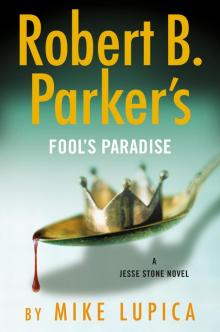 Fool's Paradise
Fool's Paradise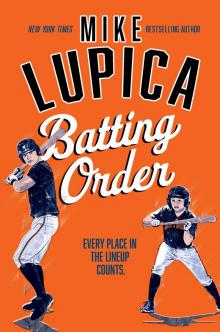 Batting Order
Batting Order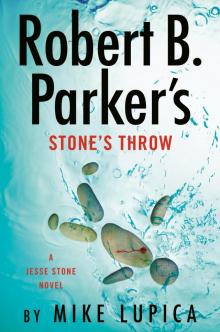 Stone's Throw
Stone's Throw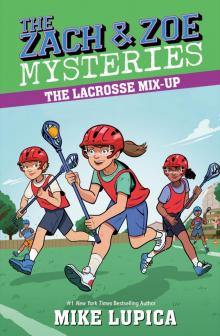 The Lacrosse Mix-Up
The Lacrosse Mix-Up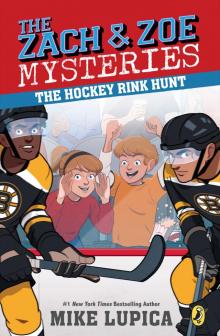 The Hockey Rink Hunt
The Hockey Rink Hunt Payback
Payback Triple Threat
Triple Threat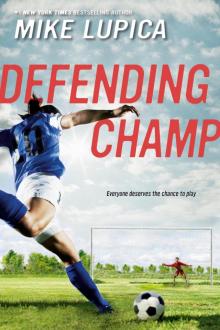 Defending Champ
Defending Champ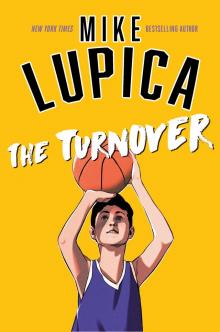 The Turnover
The Turnover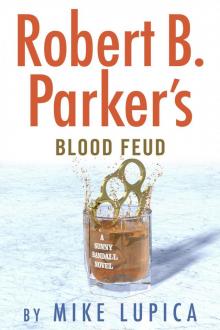 Robert B. Parker's Blood Feud
Robert B. Parker's Blood Feud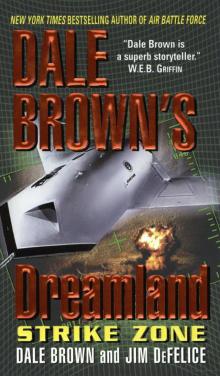 Strike Zone
Strike Zone Hero
Hero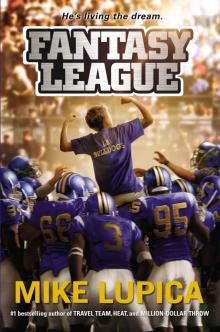 Fantasy League
Fantasy League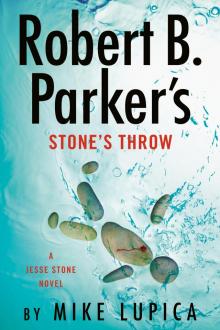 Robert B. Parker's Stone's Throw
Robert B. Parker's Stone's Throw The Big Field
The Big Field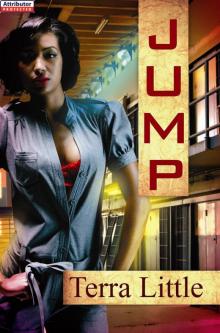 Jump
Jump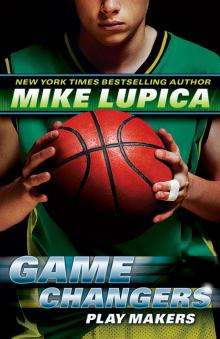 Play Makers
Play Makers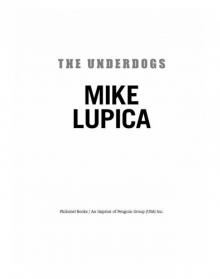 The Underdogs
The Underdogs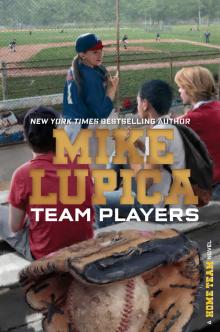 Team Players
Team Players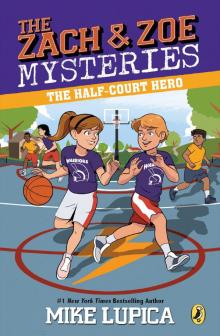 The Half-Court Hero
The Half-Court Hero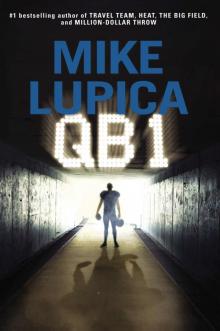 QB 1
QB 1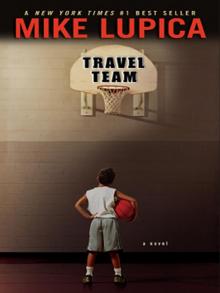 Travel Team
Travel Team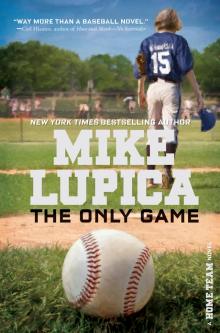 The Only Game
The Only Game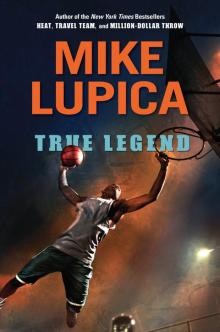 True Legend
True Legend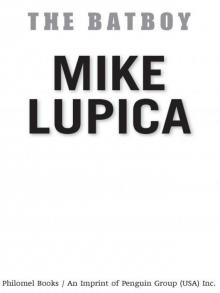 The Batboy
The Batboy Hot Hand
Hot Hand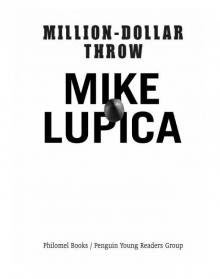 Million-Dollar Throw
Million-Dollar Throw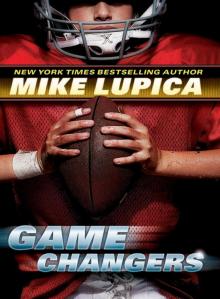 Game Changers
Game Changers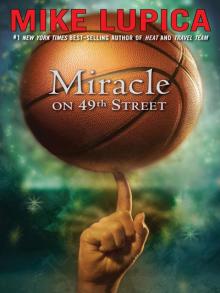 Miracle on 49th Street
Miracle on 49th Street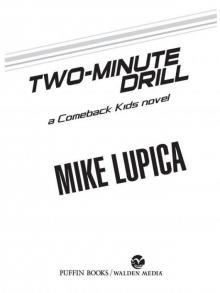 Two-Minute Drill
Two-Minute Drill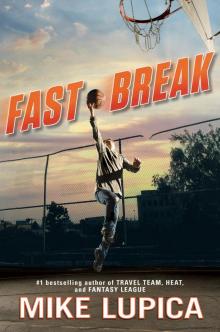 Fast Break
Fast Break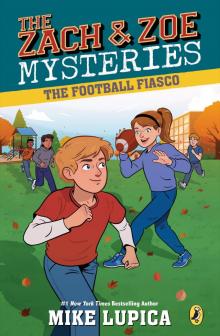 The Football Fiasco
The Football Fiasco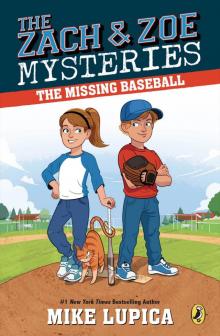 The Missing Baseball
The Missing Baseball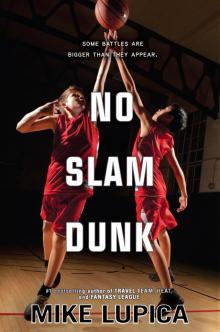 No Slam Dunk
No Slam Dunk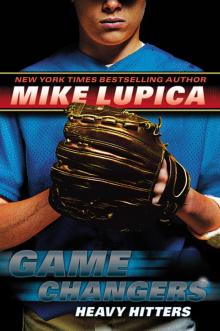 Heavy Hitters
Heavy Hitters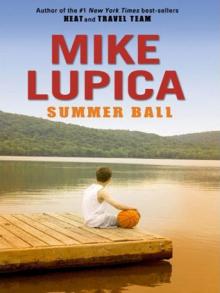 Summer Ball
Summer Ball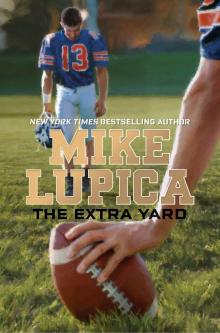 The Extra Yard
The Extra Yard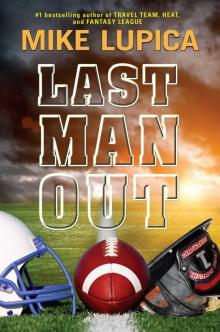 Last Man Out
Last Man Out